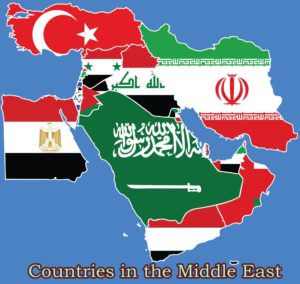Human rights violations in the Middle East deteriorating at an exponential level. Are we far too gone?

Middle East Countries
As per usual Geneva remains the platform for different international human rights meetings. As such, we are preparing for the upcoming 35th session of the Human Rights Council, the 3rd cycle Universal Periodic Review and the 60th UN Committee Against Torture, where human rights situations in the Middle East will be discussed as per usual. Nonetheless, the disconnect between the international substantive narrative and the reality on the ground is far greater than it has ever been. How is it possible then, that after all this time and all these meetings to discuss human rights violations, we are still failing? What are we missing?
Not long ago, one of our representatives and human rights defender from Bahrain, Ebtisam al-Sayegh, was detained up on her return from the United Nations in Geneva, where she participated during the 34th Human Rights Council calling for human rights reforms in Bahrain, in particular with the framework on the upcoming 3rd UPR cycle. As well, a few days ago, the Bahrain Airport authorities have arrested human rights activist Nidal Al-Salman after returning from France. The rights of human rights defenders have been persistently violated, especially since the arrest of human rights activist Nabeel Rajab in 2016. In the light of these events, it comes to no surprise that activists such as Miss al-Sayegh and Miss Al-Salman have been victims of government repression, as the Bahraini government’ travel ban targets those same activists that are voicing their concerns and are fighting against the inhumane treatments from the authorities. Saudi, on the other hand, is leading the way bycarrying the torch for repressive regimes, as they just jailed a poet for publishing a poem and are one of the countries with the highest rate of executions.
In Yemen, the human rights situation seems to be unsolvable, where 82% of the population needs desperate humanitarian assistance and 7 million Yemenis are suffering famine. The escalating Saudi invasion is reaching a point of no return, as turning a blind eye has become the dominant response from the international community. It is necessary to lift the blockade to stop the catastrophe of millions facing starvation. Yemen is now primarily relying on food import, and the last hope rests on the Red Sea port of Hodeidah, a lifeline for millions of Yemenis suffering famine.
As the human rights situation in the Middle East is alarmingly deteriorating in front of our eyes, and the political interest keeps trumping human rights interest, where are we going? It seems like we are regressively moving towards our tragic past that led to the establishment of this international human rights and peacekeeping bodies like the UN. If global institutions keep moving further away from protecting human rights, a future of peace, development and security will never be achieved. ICSFT, once again, strongly denounces the lack of involvement in the recurrent human rights violations in the Middle East and calls for the international community and relevant stakeholders to actimmediately without any delay before reaching a point of no recovery.